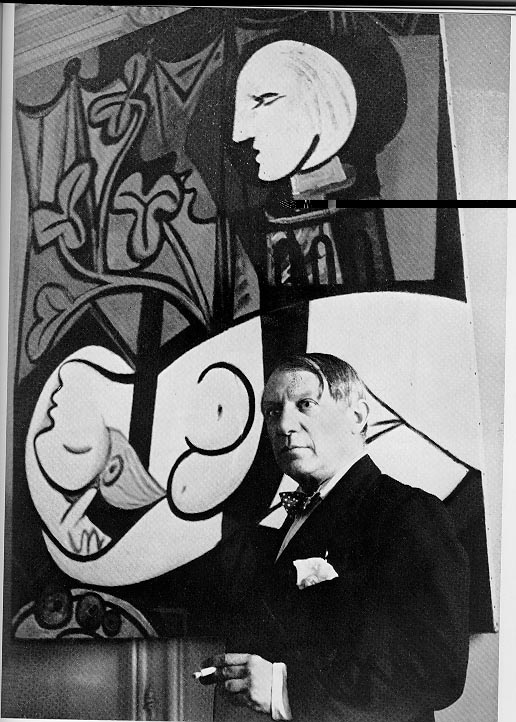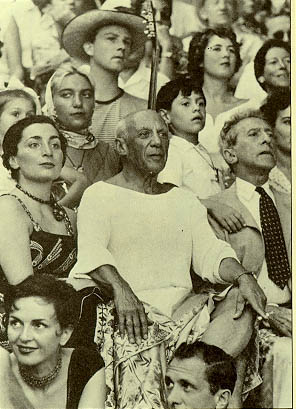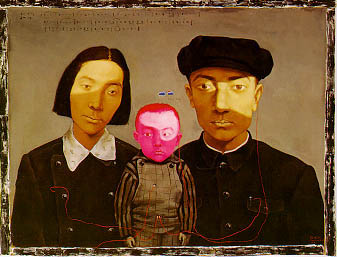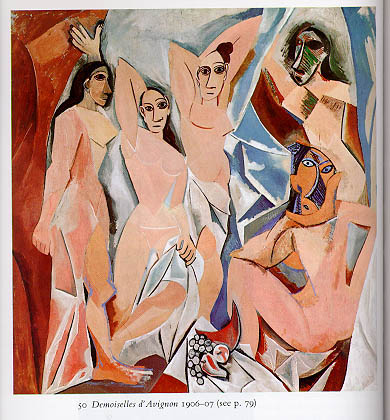![]()
![]()
π�

My name is Pablo Picasso. I am probably the best known painter of the Twentieth century. I was born in Spain and though I spent most of my adult life in France I have remained a Spaniard at heart. I inherited my talent from my artist father, my confidence from my mother.
I moved to Paris from Barcelona in my early twenties. I was very poor and life was difficult, made more so because I did not speak the language. The excitement of being in such a stimulating environment however, made up for the hardships. It was not long before I was familiar with all the museums in the city and would spend many hours studying the old master paintings. It was an invaluable learning experience. Not only did I learn from past artists but also from my contemporaries.
I was fortunate during those early years in Paris to make many new friends. We were a community of struggling artists, writers and poets, who supported and encouraged one another. Many of these friendships have lasted a lifetime although I am the first to admit to not always being an easy friend. I am moody, temperamental and subject to depression. My companions understood and accepted my many neurotic traits as an essential part of my genius.
My work has gone through many phases The Blue period (1901-1904), where the choice of color and subjects symbolized my pessimistic state of mind. The Rose period (1904-1906), a happier time which held a new promise that is reflected in my work. The portrayals of harlequins, acrobats and other performing artists at this time attest to my interest and affection for those artists that exist on the fringe of society. Towards the end of this period I began to explore the purity of form which resulted in a more sculptural, classical quality. My next major influence was that of African art, especially tribal masks and primitive statues. Their simplicity of form and emotional power would be an inspiration to me. This can be seen in my breakthrough painting of 1907, "Les Demoiselles d'Avignon", which is considered by many to be the work that started Modern Art.
In 1908, together with Georges Braque, I experimented with a new way of looking at the world, a painting style known as Cubism. This is when the artist explores his subject from every angle in the same space at the same time. It was an exciting and controversial concept, the breaking down of objects into geometric forms. It would be six years before I would return once more to a more traditional and representational way of painting. This "classic" period let to my monumental figures of the 1920's inspired by Roman statuary. I would now be accused of turning my back on Cubism, but I was unfazed. I have always believed in expressing myself as I think I ought, not necessarily in a particular style.
In the years that followed WW1, a movement named Surrealism would sweep through the art and literary worlds. I now immersed myself in the exploration of my unconscious and fantasies. A major work of this period is "The Dance", three figures, a man and two women entangled in a violently agitated dance. It is an aggressive tortured work with deformed body parts and intense colors. Once more I had created a new style.
My next important painting and one that had a deep personal meaning was "Guernica", painted in 1937. This work would be my answer to the attack on the small Basque by German bombers hired by Franco. Many innocent people, including women and children were savagely murdered. My painting was a protest of the fascist government then in power in Spain. My strong feeling for my native land is apparent in this work.
During the following years, I would experiment in different mediums such as printmaking, sculpture and ceramics besides continuing to paint. I am only truly happy when I am satisfied that my work has adequately expressed my vision.
I have but one regret and that is the public are now so inundated with reproductions of my work that they have ceased to look at the real thing. My wish would be to have the full attention of the viewer for more than a few minutes. With an open mind and heart, they may find themselves enriched by the process of seeing.

The Foster Parent
We never really get to know everything about a person. Even the people we "know" sometimes surprise us. Why then does the public believe that they know all about a celebrity? Someone with whom they have no contact other than what they read or see in the media? Look at my situation. It has been widely publicized (usually by my ex-wives and mistresses) that my behavior towards women has been less than exemplary. I, Pablo Picasso, feel that when I have acted improper in any way it is usually because I was provoked. But why does the media only publish the negative about me? Do they ever talk about what a good and loving father I am? Does the public know that I have recently taken two young Indian children into my home?
I first met Rahel and her twin brother Estha when they were seven years old, shortly after their mother died. Their maternal uncle Chacko was an old friend of mine who I had met many years ago at a Communist party rally. Chacko was at his wit's end as to what to do with the children. I offered to take them to live with my family and I for a test period. If it worked out for all concerned I would become a foster parent to them. I knew in my heart the moment I saw them that that was a distinct possibility.
They were handsome children with blue black hair and large brown eyes. Obviously intelligent, they carefully watched everything that went on around them. The seemed to exist in their own world, an intimate world, which acknowledged others but did not welcome them. There was a sadness surrounding them that was difficult to understand in children so young. What was their terrible secret? My heart went out to them but I knew better than to intrude on their privacy. They would tell me when they were ready. Trust takes time.
As time passed Rahel and Estha gradually began to open up to me. At first it was hard to understand what happened as they each told me different parts of the story at separate times. I slowly managed to put the pieces together. Now I began to understand the extent of their grief. They felt they had been the cause of their mother's leaving and subsequent death. They also felt responsible for the death of a cousin who had drowned in a boating accident. But I was not prepared for the worst. It would take many more months before they told me how they had witnessed their mother's lover, a man they had loved, being savagely beaten by the police. When they had finished their story, I pulled them close to me and cried with them.
It was at that moment I knew I had to help them deal with the past. I was the only adult left in their lives they could trust. I looked forward to the day when Rahel would be how I imagined she was before the tragedy, outgoing, willful and full of curiosity. I wanted to coax Estha out of the silent shell he had slipped into, see him animated, a sparkle in his sleepy eyes. I made a promise to myself to protect them and give them the love they so badly needed.
On second thoughts, I do not want the media to know about this aspect of my life. There are some things that are sacred. It is more important to me to live up to the children's trust. Let the public think of me what they may, they will anyway, no matter what I do.
A Reflection of Our Parents

It is safe to say that who we are is determined to a greater of lesser extent by the parents we have. Would I have become an artist if my father had not been an art instructor? Would I have had the same determination to succeed if I hadn't had such a strong mother? A mother who believed I could do no wrong? Would I have become the most famous painter of the Twentieth century if not for their influence? I think my life would have gone in a different direction.
I occasionally amuse myself by imagining what it would have been like to have had different parents. But I always seem to visualize men and women uncannily similar to my mother and father. For instance, I am drawn to the parents of Anchee Min that she portrays in her memoir. Her father, like mine, was a college instructor who taught industrial design at the Shanghai Textile Institute. Her mother was a high school teacher. That was before the Cultural Revolution changed their lives and that of other Chinese intellectuals. From then on they would work as common workers, their past education a liability rather than an asset.
I admire how they handled their situation. Like the best of parents their first thought was to protect their children. So they did their menial jobs as faithfully as they could, tried carefully to follow the party line, and did not complain. Although they were believers in Chairman Mao, they did not slavishly follow all the party rules. Their overall concern was that of the welfare of their children. Their only happiness experienced within the family unit.
They attempted to instill some sense of moral code into their children. When their oldest daughter betrayed her teacher as a spy they were both shocked and angry. I am sure there were many parents during that time in China that would have encouraged their children to spy on others. Although constrained by their circumstances the Mins seemed to have retained their sense of humanity. This took courage in a society that deemed individuality suspect.
How would I have turned out if I had been their son? Would I like many others been a fervent communist or like my father uninvolved politically and a dreamer at heart. Would I like the majority of the artists at that time produced propaganda pictures of happy smiling proletariats? Or would I have painted a painting like Van Gogh's "Starry Night"? I would like to think the dreamer in me would have done the latter. It would reflect the influence of my father and our shared enthusiasm for the magic of astronomy. The choice of subject would resonate with my mother's idealism and courage.
It is difficult for me to imagine what it must have been like to be an artist in a society that permits no freedom of thought or expression. There would be no alternative for me other than to escape as did Anchee Min. I believe if she had not had the parents that she had she would not have found the courage to take that step to freedom.
Memo from Lady Liberty.
My name is Lady Liberty and my stated purpose is to welcome the weary and oppressed from countries all over the world. I rely on an organization called L.A.L.L.(Live and Let Live), which keeps me abreast with human rights abuses around the world. It is from these troubled spots that I can expect an influx of immigrants sooner or later. From what my sources tell me a British invasion is imminent.
The trouble began in Scotland with the successful cloning of Lucy the sheep. The birthplace of the author of "Dr. Jekyll and Mr. Hyde", Robert Louis Stevenson, would seem an appropriate place for the tinkering with nature. And Lucy begets Lucy, Lucy begets Lucy and Lucy begets Lucy. This amazing accomplishment would of course lead the other (envious) scientists to ask the questions, what if�? And why not�? And so the cloning of human beings began. Ironically the Meek created the Brave new world. No thought had been giving to the loss of individuality, and as to Freedom, try to find an ordinary man on the street who even knows what the word means.
There is now a glimmer of hope. It is rumored that copies of the Declaration of Independence can now be obtained but only by the so-called elite, the Alpha Pluses. We are optimistic that they will read it and in time understand the sentiments expressed in that great work. If the words have the effect we hope then the Alphas will eventually pass on this wisdom to the Betas, Gammas, Deltas and Epsilons. This could initially be accomplished by intoning during sleeping hours "think for yourself", over and over again. This would then be followed up by educational courses such as an introduction to the world's greatest thinkers and a thorough grounding on the unlimited possibilities of individual choice. But this is all in the future. Our immediate responsibility is to get ready for the first wave of immigrants.
We are confident that the news of the Kenneth Starr investigation of President Clinton's sex life has not yet reached the British shores. From what we understand the British Government allows no foreign news. This would no doubt have discouraged those brave souls whose belief in American democratic ideals would lead them to cross the Atlantic. Ah! How it pains me to see this happening in the land of the free.
Let's look to the future where sanity will prevail and the individual will once again have the rights to privacy. So we will prepare for our British brothers and sisters. We will sweep out Ellis Island, put on the kettle for tea and organize a parade on Fifth Avenue. (Dress is optional).
Ruminations of Picasso

There is so much on my mind that I doubt I'll be able to sleep the new paintings that are taking me in a different direction they lovely young woman who came here today francoise francoise what am I going to do about dora I cant worry about that I have done all I could for her and if she is acting crazy it is not my fault she knew what she was getting into when we first met and I helped her develop into a painter she bores me anyway she may be clever and witty but I am tired of her tantrums and her always being so depressed she is no good for my work now with francoise she is full of life and evidently in love with me although she tries not to show it she is so young she thinks I don't see through her when she plays games with me like not showing up sometimes for weeks on end but she doesn't realize that I have patience and have my work to keep me occupied I never get tired of that there is nothing more important to me than my work I have always been driven my mother used to say pablo if you became a soldier you would end up a general if you became a monk you would end up as pope instead I became a painter and became picasso no woman has ever loved me like my mother did and I have never loved a woman like I loved her women are always wonderful at the beginning of a relationship warm and tender and eager to please but as time goes by they become possessive I don't want to belong to any one person.
I always realize when my feelings towards a woman begin to change it is in my paintings even before I become consciously aware of it ar first I am the only one to detect the new severity in the lines of the face they eyes that gradually become more soulless the downturn of the thin lips the droopy breasts the grasping hands and the talon like nails when the women see these portrayals they know that the relationship is over but francoise is everything I want I will never tire of her she will always be my love I am sixty now and afraid of dying she will make me feel alive again but I will have to proceed slowly she is like a frightened bird she will fly off if I am not careful I cant be too aggressive a I told her today anything worth having is worth waiting for I believe that if a woman is too easy there is no challenge and I have to have a challenge I love the challenge of art the different mediums the variety of materials always something new to discover new ways of looking at the world it is always changing just as we ourselves are always changing what new materials can I work with who is to say that canvas and paints is the only way of expression for an artist ancient man once carved outlines of his world with primitive tools on the walls of caves who is to say that a piece of newspaper a fragment of wallpaper placed on a canvas is not legitimate art art is what makes a person think of new ways of looking at the world it should set fire to the imagination should transcend the ordinary all this energy will I have time to do all the things I want to do life is so short but francoise could make time stand still for me.